

Muscle Atrophy: Causes, Symptoms, and Diagnosis. Muscle atrophy is when muscles waste away.
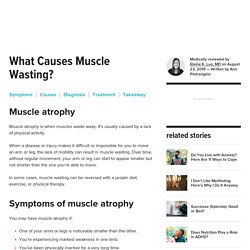
It’s usually caused by a lack of physical activity. When a disease or injury makes it difficult or impossible for you to move an arm or leg, the lack of mobility can result in muscle wasting. Over time, without regular movement, your arm or leg can start to appear smaller but not shorter than the one you’re able to move. In some cases, muscle wasting can be reversed with a proper diet, exercise, or physical therapy. You may have muscle atrophy if: One of your arms or legs is noticeably smaller than the other.You’re experiencing marked weakness in one limb.You’ve been physically inactive for a very long time. Call your doctor to schedule a complete medical examination if you believe you may have muscle atrophy or if you are unable to move normally.
Unused muscles can waste away if you’re not active. Muscle atrophy can also happen if you’re bedridden or unable to move certain body parts due to a medical condition. You may have muscle atrophy if: Stroke Signs and Symptoms. Sudden severe headache with no known cause is a stroke sign in men and women.
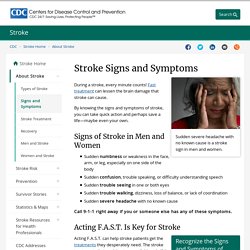
During a stroke, every minute counts! Fast treatment can lessen the brain damage that stroke can cause. By knowing the signs and symptoms of stroke, you can take quick action and perhaps save a life—maybe even your own. Signs of Stroke in Men and Women Sudden numbness or weakness in the face, arm, or leg, especially on one side of the bodySudden confusion, trouble speaking, or difficulty understanding speechSudden trouble seeing in one or both eyesSudden trouble walking, dizziness, loss of balance, or lack of coordinationSudden severe headache with no known cause Call 9-1-1 right away if you or someone else has any of these symptoms. Acting F.A.S.T. Published October 26, 2015. Careers in Science. Careers in Health and Physical Education.
(1) How does asthma work? - Christopher E. Gaw. (1) The surprising cause of stomach ulcers - Rusha Modi. (1) What happens during a stroke? - Vaibhav Goswami. (1) What happens during a heart attack? - Krishna Sudhir. (1) Types of pulmonary diseases. What is a Rheumatologist? Disease, Illness, and Disability. Respiratory system diseases. Pneumoconiosis – literally, “an abnormal condition of dust in the lungs.”
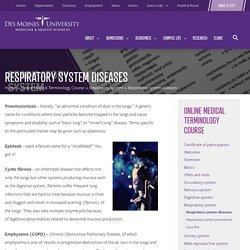
A generic name for conditions where toxic particles become trapped in the lungs and cause symptoms and disability such a “black lung” or “miner’s lung” disease. Terms specific to the particulate matter may be given such as asbestosis. Epistaxis – want a fancier name for a “nosebleed?” You got it! Cystic fibrosis – an inheritable disease that affects not only the lungs but other systems producing mucous such as the digestive system. Emphysema (COPD) – Chronic Obstructive Pulmonary Disease, of which emphysema is one of, results in progressive destruction of the air sacs in the lungs and loss of respiratory membrane for oxygen exchange. 16 Muscle Diseases and Disorders You Need to Know.
Muscular system diseases affect one of the most important structures in the human body: muscle.
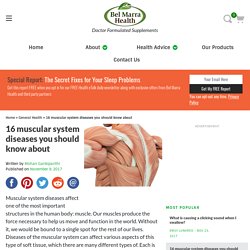
Our muscles produce the force necessary to help us move and function in the world. Without it, we would be bound to a single spot for the rest of our lives. Diseases of the muscular system can affect various aspects of this type of soft tissue, which there are many different types of. Each is separate and distinct, all controlled by our central nervous symptom in some capacity.
Circulatory system diseases. Muscle, Bone & Skeletal Diseases. The musculoskeletal system consists of the body's bones, muscles, tendons, ligaments, joints, and cartilage.
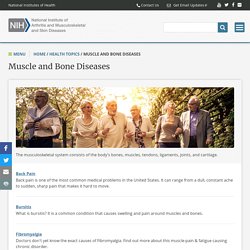
Back Pain Back pain is one of the most common medical problems in the United States. It can range from a dull, constant ache to sudden, sharp pain that makes it hard to move. Bursitis What is bursitis? Fibromyalgia Doctors don't yet know the exact causes of Fibromyalgia. Fibrous Dysplasia What is fibrous dysplasia? Growth Plate Injuries Injuries to the growth plate happen when a break or fracture develops near or at the end of a long bone.
Hip Replacement Surgery Hip replacement surgery removes damaged or diseased parts of a hip joint and replaces them with new, man-made parts. Joint Replacement Surgery Joint replacement surgery removes damaged or diseased parts of a joint and replaces them with new, man-made parts. Knee Problems Knee problems happen when you injure or develop disease in your knee and it can’t do its job. Marfan Syndrome What is Marfan syndrome? Osteogenesis Imperfecta. Nervous system diseases. Asthma. Overview Asthma is a condition in which your airways narrow and swell and produce extra mucus.
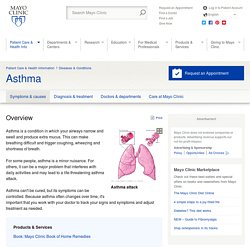
This can make breathing difficult and trigger coughing, wheezing and shortness of breath. For some people, asthma is a minor nuisance. For others, it can be a major problem that interferes with daily activities and may lead to a life-threatening asthma attack. Asthma can't be cured, but its symptoms can be controlled. Symptoms Asthma symptoms vary from person to person. Asthma signs and symptoms include: Digestive Diseases.